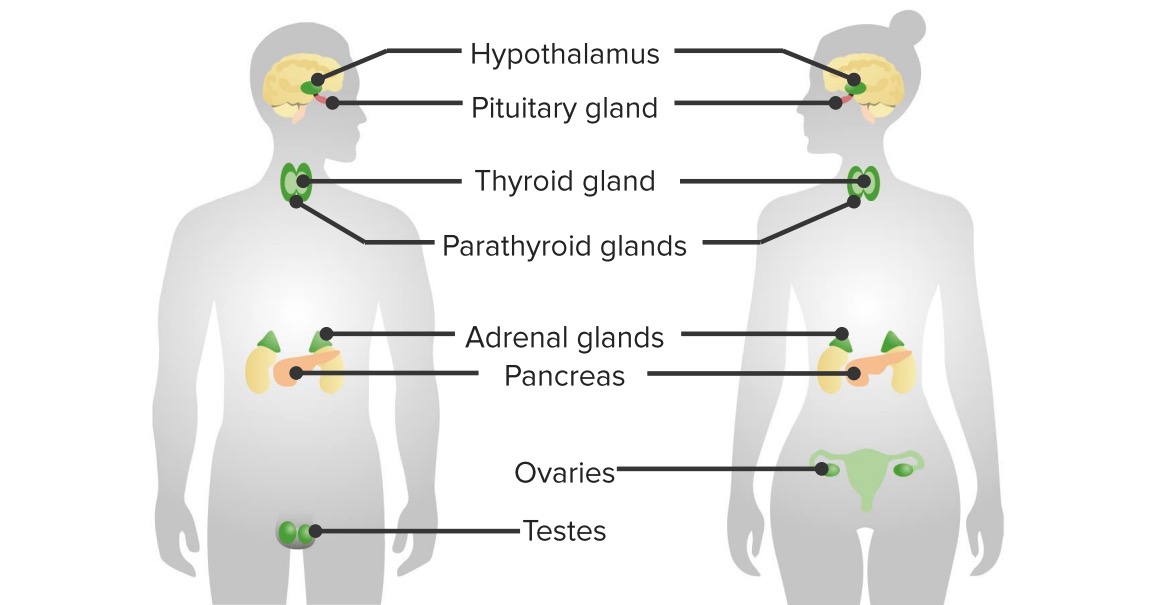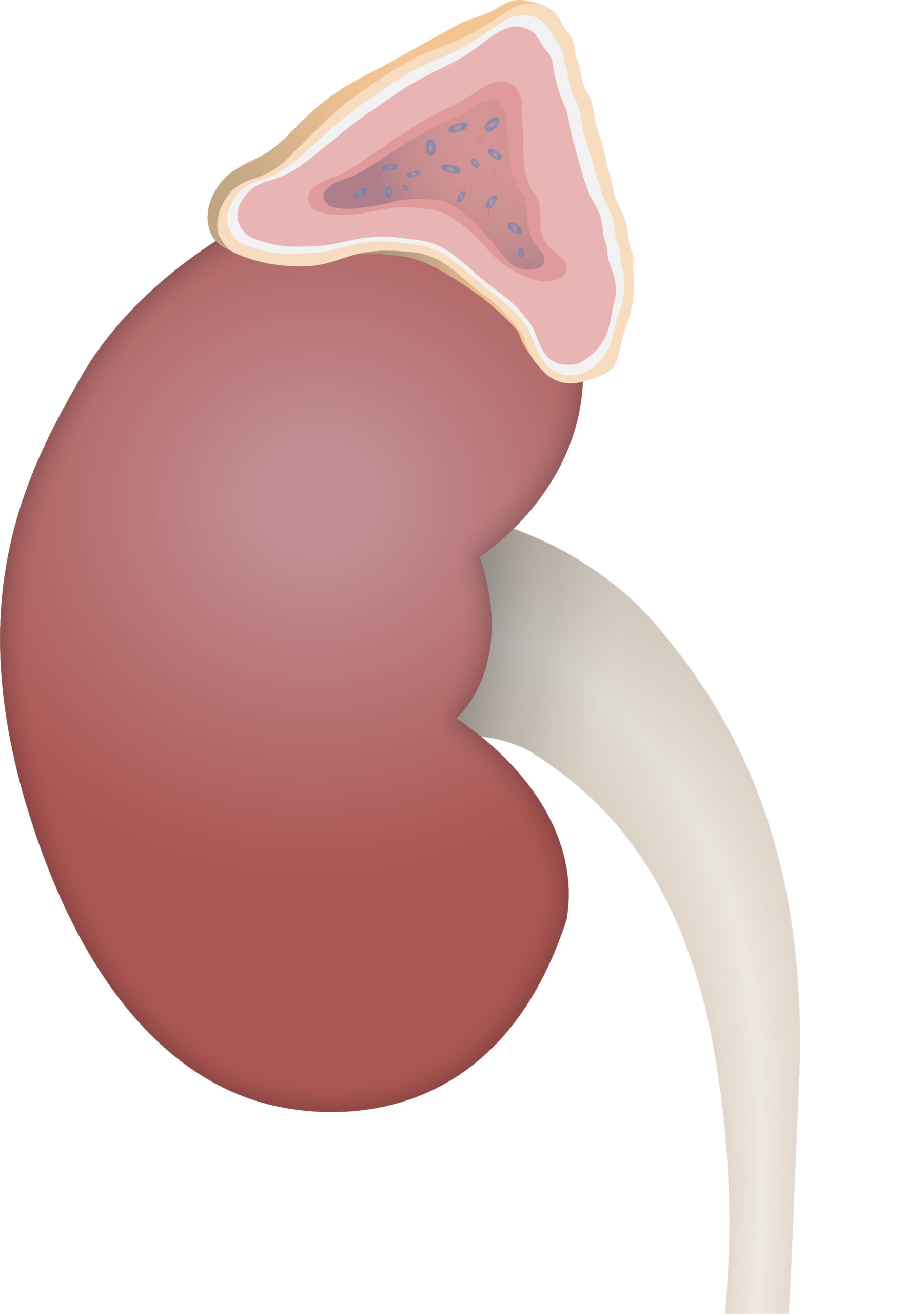Playlist
Show Playlist
Hide Playlist
Adrenal Insufficiency: Definition & Etiology
-
Slides AdrenalInsufficiencyCongenitalHyperplasia EndocrinePathology.pdf
-
Download Lecture Overview
00:02 Adrenal Gland pathology: Here, we’ll take a look at adrenal insufficiency and the various causes. 00:08 Normal adrenal, a cartoon of… take a little section of that adrenal gland and you blow it up and you’ll find the cells to be perfectly aligned and in proper organization. 00:20 A very common cause of adrenal gland destruction would be autoimmune disease resulting in what’s known as Addison’s. 00:28 Remember that Addison’s is a primary adrenal insufficiency, this is an adrenal gland, but this time around, our cartoon here on your right column is showing you an amplified version of a adrenal tissue in which we see antibody, autoimmune disease, literally, autoimmune disease in which it’s attacking the cells of the adrenals causing complete annihilation of the adrenals thus resulting in Addison’s a.k.a. primary adrenal insufficiency. 01:01 What else may cause Addison’s? Well, what about TB? Tuberculosis may result in destruction of your adrenal or you might have granulomatous formation. 01:12 If you have infections resulting in maybe Waterhouse–Friderichsen in which there is acute haemorrhage into the adrenal gland causing complete destruction of it and so, therefore, Addison’s. 01:26 You can have iron overload, maybe your patient has an HFE gene that chromosome abnormality called hereditary hemochromatosis or perhaps has major, major type of anaemia or severe anaemia such as beta thalassemia major and therefore, warrants from the tender age of, let’s say, six months or even younger upon or with transfusion for 20 years taking such transfusions may result in iron overload or secondary hemochromatosis. 01:59 And hemochromatosis causing damage to many, many, many, many organs including your heart, including the pancreas, including the skin or maybe perhaps, as shown here in the picture exaggerated, iron overload. 02:12 So, our topic is primary adrenal insufficiency. 02:16 Autoimmune, it could be a part of and is part of what’s known as polyglandular autoimmune endocrinopathy. 02:24 Multiple glands that are being destroyed by autoimmune diseases, these include your thyroid gland Hashimoto, hypothyroidism at least know type I; speaking of which, here, we have type I diabetes mellitus. 02:37 What kind of destruction to the pancreas? Autoimmune destruction. 02:42 And the trilogy of polyglandular the third and final one would be the adrenal gland, all part of polyglandular autoimmune endocrinopathy. 02:50 If you thought that MEN 1 and 2a and 2b was hard enough to remember, add one more to your list now… polyglandular autoimmune endocrinopathy. 03:03 Infections such as TB may cause a destruction or bilateral adrenal haemorrhage can be part of meningococcemia, Neisseria known as Waterhouse–Friderichsen syndrome are resulting in primary adrenal insufficiency during anticoagulation or perhaps even in the setting of lupus anticoagulant. 03:23 All these may result in what’s known as massive haemorrhage into both of the adrenals causing massive primary adrenal insufficiency. 03:30 AIDS, amyloidosis, sarcoidosis, hemochromatosis and metastatic cancer could all cause complete destruction of the adrenals. 03:41 Pause here for a second. 03:42 We completed discussion of primary adrenal insufficiency, let us now move on to secondary adrenal insufficiency. 03:48 Where’s my problem? Maybe it’s a pituitary disease, what happened? Sheehan, infarction, apoplexy, haemorrhage… oh, maybe there is a non-functioning adenoma within my pituitary resulting in hypofunctioning. 04:06 Long term exogenous steroid administration. 04:08 Now, pause here for a second; big time, pay attention. 04:13 You’re giving your patient steroid. 04:15 “Dr. Raj, didn’t you say that that caused the most common cause of Cushing’s?” Yeah, what’s my topic here? Adrenal insufficiency. 04:27 Interesting! So, we’re going to walk through this in great detail right now. 04:32 You’re giving your patient prednisone, why? Oh, maybe because of needs of immunosuppression. 04:40 Maybe giving prednisone because you are taking care of some type of inflammatory state long term such as rheumatoid arthritis, okay? So, you’re giving prednisone over a long period of time, what’s your patient look like? Moon facies, buffalo hump, trunk obesity, purple striae, red striae; worst at extremities, right, prototypical Cushing’s. 05:03 Can you now work with me what’s going on inside the body? So, you’re giving prednisone, a type of glucocorticoid, what’s going to happen to your levels of ACTH? You’re going to suppress it, abnormal… this patient has no more access, what do you mean access? Access between the hypothalamus and the pituitary and the adrenal… perfectly normal. 05:26 You’re giving prednisone, you’re giving glucocorticoid, you suppress ACTH. 05:30 Let’s go one step further. 05:32 If you don’t have the ACTH, what then happens to the adrenals bilaterally? Atrophy. 05:41 This is the same analogous pathogenesis of what you know about with… let’s say you have a football player taking steroids and what do you know about that football player perhaps? What are you going to recommend or what do you… what kind of instructions are you giving this football player or the patient that you’re giving this steroids may be? That he may become infertile. 06:07 So, when you’re giving steroids, you then knock out the anterior pituitary, you don’t have LH and FSH and therefore, the gonads are not working properly. 06:16 Here, you’re giving or the patient’s taking glucocorticoids, you knock out the ACTH and the adrenals aren’t working properly even though your patient may look like they have Cushing’s, which they do. 06:30 Well, in the inside, you want to be very careful. 06:32 So, with all that said, if you stop glucocorticoid treatment immediately, abruptly, what’s the most important stress hormone? Cortisol. 06:45 If you abruptly stop or cessate your cortisol administration, your patient’s dead. 06:53 Why? Because the adrenals became atrophic over that long term exogenous steroid administration. 07:00 You see how important this is. 07:03 So, when you say steroid here, you want to think of two different administrations from the adrenal zona glomerulosa or fasciculata or reticularis or fasciculata, the steroid… all of those are steroids; cortisol, glucocorticoid resulting in adrenal insufficiency and do not forget about the example that I gave you with testosterone… anabolic steroids. 07:27 You see how important that bullet point was or is? Do not take anything for face value, everything that I gave you has incredible, incredible clinical significance.
About the Lecture
The lecture Adrenal Insufficiency: Definition & Etiology by Carlo Raj, MD is from the course Adrenal Gland Disorders.
Included Quiz Questions
Which condition presents with adrenal insufficiency and evidence of granulomas in the adrenal glands?
- Tuberculosis
- Autoimmunity
- Iron overload
- Adrenal infarction
- Viral destruction of adrenal tissue
Which organs are commonly affected by polyglandular autoimmune endocrinopathy?
- Adrenal glands, pancreas, and thyroid
- Adrenal glands, hypothalamus, and pancreas
- Adrenal glands, thyroid, and gonads
- Adrenal glands, thymus, and pancreas
- Adrenal glands, thalamus, and pancreas
What is NOT a cause of primary adrenal insufficiency?
- Exogenous steroid administration
- Hemochromatosis
- Sarcoidosis
- AIDS
- Amyloidosis
What condition features bilateral atrophy of the adrenal glands?
- Exogenous steroid administration
- Hyperthyroidism
- Decreased levels of cortisol
- Sarcoidosis
- Iron overload
Customer reviews
5,0 of 5 stars
| 5 Stars |
|
5 |
| 4 Stars |
|
0 |
| 3 Stars |
|
0 |
| 2 Stars |
|
0 |
| 1 Star |
|
0 |






